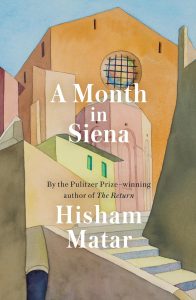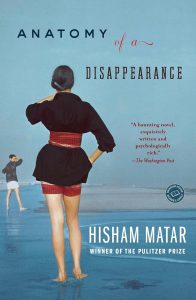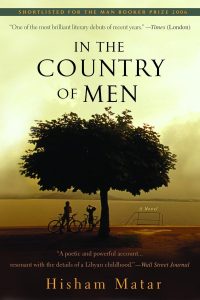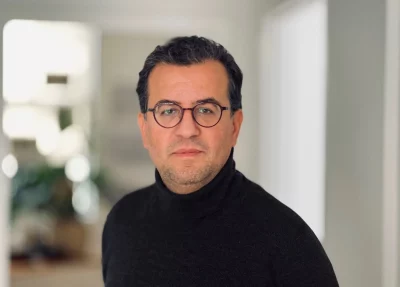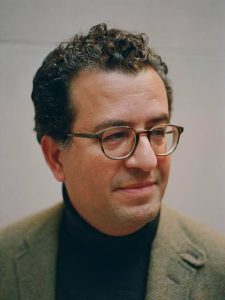

Hisham Matar
Pulitzer Prize-winning Author
PEN America Jean Stein Book Award
Twice Nominated for Booker Prize
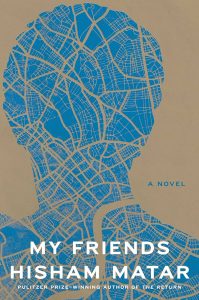
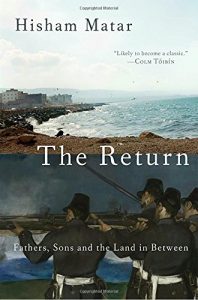
Readings &
Lecture Topics
- Automated Imagination: Literature in the Age of AI
- Migrating Tongues: On Marking the Distances
- Writing on Art: the Virtues of Slow Looking
- On Revolution: Descent and the Politics of Now
- An Evening with Hisham Matar
Biography
“Deeply affecting, generous and wise, and all these virtues come in writing of extraordinary elegance, with one of those voices that you want to listen to for the rest of your life.” —Juan Gabriel Vásquez
“Matar writes with both a novelist’s eye for physical and emotional detail, and a reporter’s tactile sense of place and time. The prose is precise, economical, chiseled; the narrative elliptical, almost musical. Haunting.” —The New York Times Book Review
“Hisham Matar has the quality all historians–of the world and the self–most need: he knows how to stand back and let the past speak.” –Hilary Mantel
Born in New York City to Libyan parents, Hisham Matar spent his childhood in Tripoli and Cairo and has lived most of his adult life in London, but since 2010 he has a home in New York City. His debut novel, In the Country of Men (2008), was shortlisted for the Booker Prize and the National Book Critics Circle Award, and won numerous international prizes, including the Royal Society of Literature Ondaatje Prize, a Commonwealth First Book Award, the Premio Flaiano and the Premio Gregor von Rezzori. He is also the author of the novel Anatomy of a Disappearance (2011), which was named one of the best books of the year by The Guardian and the Chicago Tribune.
His memoir The Return: Fathers, Sons and the Land in Between (2016), which won the 2017 Pulitzer Prize for nonfiction, the PEN/Jean Stein Book Award, and was a finalist for the National Book Critics Circle Award and the Los Angeles Times Book Prize, explores the mysterious disappearance of his father. The Pulitzer Prize citation praised The Return as “a first-person elegy for home and father.” Transforming his personal quest for answers into a brilliantly told universal tale of hope and resilience, Matar has given us an unforgettable work with a powerful human question at its core: How does one go on living in the face of unthinkable loss?
A moving contemplation of the relationship between art and life, his second memoir A Month in Siena (2019) offers a meditation on how centuries-old art can illuminate our own inner landscape—current relationships, long-lasting love, grief, intimacy, and solitude—and shed further light on the present world around us.
Matar is the author of My Friends (2024), a novel about exile, friendship, and family, which won the National Book Critics Circle Award and the Orwell prize for Political Fiction, was shortlisted for the National Book Award, and was longlisted for the 2024 Booker Prize. Claire Messud observed how the narrative “recounts an exile’s life shattered by violence, yet sustained, fiercely if complicatedly, by friendship. An unforgettable novel—wise, urgent, and profound—from one of our era’s great writers.” Maaza Mengiste said of the work: “If there is a language of exile, My Friends is what it sounds like: exquisite and painful, compassionate and unflinching, and, above all, overwhelming in its boundless hope that within exile rests a path toward a different kind of return—one that leads us back to ourselves.”
Matar speaks on a wide range of topics from the role of literature in the age of AI to revolution and the politics of now, as well as the power and peace to be found in slow looking and writing about art. He is a professor at Barnard College and is a fellow of the Royal Society of Literature and an honorary fellow of the Royal Academy of Arts. His work has been translated into thirty languages.
Matar lives in London and New York.
Short Bio
Hisham Matar is the Pulitzer Prize-winning author of three novels and two works of memoir. His novels include In the Country of Men (2008), which was shortlisted for the Booker Prize and the National Book Critics Circle Award and won numerous international prizes, Anatomy of a Disappearance (2011), named one of the best books of the year by The Guardian and the Chicago Tribune, and My Friends (2024), a novel about exile, friendship, and family, which won the National Book Critics Circle Award and the Orwell prize for Political Fiction, was shortlisted for the National Book Award, and was longlisted for the 2024 Booker Prize. Matar’s memoir, The Return: Fathers, Sons and the Land in Between (2016), won the 2017 Pulitzer Prize for nonfiction, the PEN/Jean Stein Book Award, and was a finalist for the National Book Critics Circle Award and the Los Angeles Times Book Prize. His second memoir, A Month in Siena (2019), offers a meditation on how centuries-old art can illuminate our own inner landscape and shed further light on the present world around us. Matar is a professor at Barnard College and is a fellow of the Royal Society of Literature and an honorary fellow of the Royal Academy of Arts. He lives in London and New York.
Publications
My Friends
Fiction, 2024
“Totally absorbing. As always, Matar’s writing is elegant and metaphorically rich, filled with carefully drawn portraits of Khaled and his intelligent, highly articulate friends and dramatic renderings of their intense conversations. Above all, there is the force of powerful emotions: outrage, grief, love. My Friends is a major literary accomplishment.” –New York Review of Books
Khaled and Mustafa meet at university in Edinburgh: two Libyan eighteen-year-olds expecting to return home after their studies. In a moment of recklessness and courage, they travel to London to join a demonstration in front of the Libyan embassy. When government officials open fire on protestors in broad daylight, both friends are wounded, and their lives forever changed.
Over the years that follow, Khaled, Mustafa and their friend Hosam, a writer, are bound together by their shared history. If friendship is a space to inhabit, theirs becomes small and inhospitable when a revolution in Libya forces them to choose between the lives they have created in London and the lives they left behind.
A Month in Siena
Memoir, 2019
After finishing his powerful memoir The Return, Hisham Matar, seeking solace and pleasure, traveled to Siena, Italy. Always finding comfort and clarity in great art, Matar immersed himself in eight significant works from the Sienese School of painting, which flourished from the thirteenth to the fifteenth centuries. Artists he had admired throughout his life, including Duccio and Ambrogio Lorenzetti, evoke earlier engagements he’d had with works by Caravaggio and Poussin, and the personal experiences that surrounded those moments.
Including beautiful full-color reproductions of the artworks, A Month in Siena is about what occurred between Matar, those paintings, and the city. That month would be an extraordinary period in the writer’s life: an exploration of how art can console and disturb in equal measure, as well as an intimate encounter with a city and its inhabitants. This is a gorgeous meditation on how centuries-old art can illuminate our own inner landscape—current relationships, long-lasting love, grief, intimacy, and solitude—and shed further light on the present world around us.
The Return: Fathers, Sons and the Land in Between
Memoir, 2016
“The Return is tremendously powerful. Although it filled me with rage again and again, I never lost sight of Matar’s beautiful intelligence as he tried to get to the heart of the mystery. I am so very grateful he has written this book.” –Peter Carey
In 2012, after the overthrow of Qaddafi, the acclaimed novelist Hisham Matar journeys to his native Libya after an absence of thirty years.
When he was twelve, Matar and his family went into political exile. Eight years later Matar’s father, a former diplomat and military man turned brave political dissident, was kidnapped from the streets of Cairo by the Libyan government and is believed to have been held in the regime’s most notorious prison.
Now, the prisons are empty and little hope remains that Jaballa Matar will be found alive. Yet, as the author writes, hope is “persistent and cunning.”
Winner of the 2017 Pulitzer Prize for biography/autobiography, the PEN/Jean Stein Book Award, France’s Prix du livre étranger, and a finalist for the Orwell Book Prize and the 2016 National Book Critics Circle Award, The Return is a brilliant and affecting portrait of a country and a people on the cusp of immense change, and a disturbing and timeless depiction of the monstrous nature of absolute power.
Anatomy of a Disappearance
Fiction, 2012
Nuri is a young boy when his mother dies. It seems that nothing will fill the emptiness her death leaves behind in the Cairo apartment he shares with his father—until they meet Mona, sitting in her yellow swimsuit by the pool of the Magda Marina hotel. As soon as Nuri sees Mona, the rest of the world vanishes. But it is Nuri’s father with whom Mona falls in love and whom she eventually marries. Their happiness consumes Nuri to the point where he wishes his father would disappear. Nuri will, however, soon regret what he’s wished for. When his father, a dissident in exile from his homeland, is abducted under mysterious circumstances, the world that Nuri and his stepmother share is shattered. And soon they begin to realize how little they knew about the man they both loved.
In the Country of Men
Fiction, 2006
Libya, 1979. Nine-year-old Suleiman’s days are circumscribed by the narrow rituals of childhood: outings to the ruins surrounding Tripoli, games with friends played under the burning sun, exotic gifts from his father’s constant business trips abroad. But his nights have come to revolve around his mother’s increasingly disturbing bedside stories full of old family bitterness. And then one day Suleiman sees his father across the square of a busy marketplace, his face wrapped in a pair of dark sunglasses. Wasn’t he supposed to be away on business yet again? Why is he going into that strange building with the green shutters? Why did he lie?
Suleiman is soon caught up in a world he cannot hope to understand—where the sound of the telephone ringing becomes a portent of grave danger; where his mother frantically burns his father’s cherished books; where a stranger full of sinister questions sits outside in a parked car all day; where his best friend’s father can disappear overnight, next to be seen publicly interrogated on state television.
Articles & Audio
Read What’s In Print
• Hisham Matar’s Latest Novel Explores a Divided Soul – The New Yorker
• My Friends by Hisham Matar review – the pain of exile – The Guardian
• Hisham Matar on Writing Male Friendships – Electric Literature
• In My Friends an Exile Finds Himself Outside Libya, but Never Far Away – New York Times
• The Return by Hisham Matar – exquisite pain of a fatherless son – The Guardian
• A Son Searches For His Missing Dissident Father In The Return – NPR
• Hisham Matar in conversation about his novel about three Libyan friends in exile – Bookseller
• Interview: Writing Is Doomed to Fail. That’s Why Hisham Matar Loves It. – New York Times
• Review: The Return, a Son’s Pained Search for a Missing Father – New York Times
Listen to Audio
• ‘Our friendships are our fate’: Novelist Hisham Matar on revolution and relationships – NPR
• Hisham Matar on My Friends: London, Libya, and Living in Exile – The Hatchards Podcast
• Devorah Baum & Hisham Matar: ‘On Marriage’ – London Review Bookshop Podcast
• On “Moving On” From Tragedy, Documenting Family Stories, and Connecting with Art – Podcast Noor
Selected Writings
• “The Eyes of Others” – Harpers Magazine
• Excerpt from The Return – Literary Hub
My Friends by Hisham Matar, an excerpt originally published with CBS News
It is, of course, impossible to be certain of what is contained in anyone’s chest, least of all one’s own or those we know well, perhaps especially those we know best, but, as I stand here on the upper level of King’s Cross Station, from where I can monitor my old friend Hosam Zowa walking across the concourse, I feel I am seeing right into him, perceiving him more accurately than ever before, as though all along, during the two decades that we have known one another, our friendship has been a study and now, ironically, just after we have bid one another farewell, his portrait is finally coming into view. And perhaps this is the natural way of things, that when a friendship comes to an inexplicable end or wanes or simply dissolves into nothing, the change we experience at that moment seems inevitable, a destiny that was all along approaching, like someone walking toward us from a great distance, recognizable only when it is too late to turn away. No one has ever been a nearer neighbor to my heart. I am convinced, as I watch him go to his train for Paris, that city where the two of us first met so long ago and in the most unlikely way, that he is carrying, right where the rib cages meet, an invisible burden, one, I believe, I can discern from this distance.
When he still lived here in London, hardly a week would pass without us taking a walk, either through the park or along the river. We sometimes got into a debate, usually concerning an obscure literary question, arguments that, perhaps like all arguments, concealed deeper disagreements. I would sometimes, to my regret, for the gesture has always displeased me, tap my forefinger on his chest and let my palm rest there for a fleeting moment, as though to keep whatever it was that I believed I had placed there stable, and I would once again take note of the distinct pattern of his ribs, the strange way his bones protruded, as if in constant expectation of an attack.
He does not know that I am still here. He thinks I have left, rushed off to the dinner engagement I told him I was already late for. I am not sure why I lied.
“Who are you eating with?” he asked.
“No one you know,” I replied.
He looked at me then as if we had already parted ways and the present was the past, I standing at the shore and he on board the ship sailing into the future.
That burden in the chest, I can see, has rolled his shoulders back a little, causing his hips to fall forward so as to compensate and stop him falling, at the slightest push, face-first. And yet he does look, from this distance, like a man possessed by action, moving forward, determined to enter his new life.

